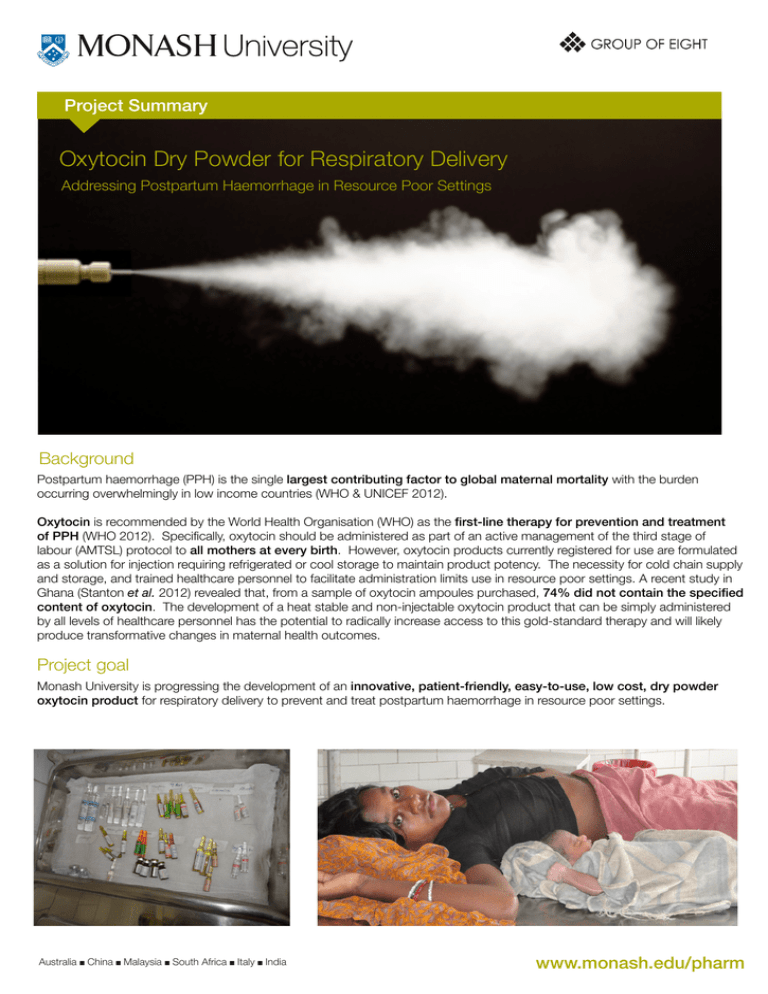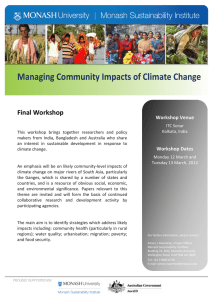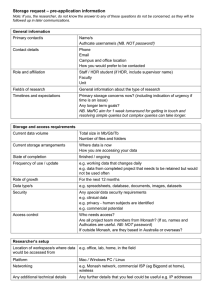Oxytocin Dry Powder for Respiratory Delivery Project Summary Background
advertisement

Project Summary Oxytocin Dry Powder for Respiratory Delivery Addressing Postpartum Haemorrhage in Resource Poor Settings Background Postpartum haemorrhage (PPH) is the single largest contributing factor to global maternal mortality with the burden occurring overwhelmingly in low income countries (WHO & UNICEF 2012). Oxytocin is recommended by the World Health Organisation (WHO) as the first-line therapy for prevention and treatment of PPH (WHO 2012). Specifically, oxytocin should be administered as part of an active management of the third stage of labour (AMTSL) protocol to all mothers at every birth. However, oxytocin products currently registered for use are formulated as a solution for injection requiring refrigerated or cool storage to maintain product potency. The necessity for cold chain supply and storage, and trained healthcare personnel to facilitate administration limits use in resource poor settings. A recent study in Ghana (Stanton et al. 2012) revealed that, from a sample of oxytocin ampoules purchased, 74% did not contain the specified content of oxytocin. The development of a heat stable and non-injectable oxytocin product that can be simply administered by all levels of healthcare personnel has the potential to radically increase access to this gold-standard therapy and will likely produce transformative changes in maternal health outcomes. Project goal Monash University is progressing the development of an innovative, patient-friendly, easy-to-use, low cost, dry powder oxytocin product for respiratory delivery to prevent and treat postpartum haemorrhage in resource poor settings. www.monash.edu/pharm Australia ■ China ■ Malaysia ■ South Africa ■ Italy ■ India wwww.monash.edu/pharm Oxytocin for respiratory delivery Drug delivery to the respiratory tract is a common means of drug administration in developed and emerging economies for airway diseases such as asthma and chronic obstructive airway disease (COPD). While these treatments deliver the drug for local activity within the airways, the potential exists to use the respiratory tract (pulmonary or nasal) as a delivery route to the systemic circulation. This approach has been used previously as an effective and non-invasive route for the systemic administration of peptide molecules that are not bioavailable following oral administration (e.g calcitonin, desmopressin and insulin). Indeed, oxytocin (also a small peptide) has been marketed in a number of countries as a solution nasal spray for the augmentation of lactation. Formulation of oxytocin as a dry powder presents the possibility of a heat stable product eliminating the need for the controlled storage associated with liquid forms of the drug. Further, dry powder inhalation (or nasal) delivery is a proven non-invasive technology that offers the opportunity to effectively deliver oxytocin to the respiratory tract from where it is rapidly absorbed into the bloodstream and can exert its therapeutic effect on the uterus. Project status The project is at an early stage, however, there has been considerable progress towards the development of a heat stable and rapidly effective oxytocin product delivered to the respiratory tract. The lead candidate is directed to inhaled (pulmonary) delivery and the following key milestones have been achieved: ■ ■ A prototype dry powder formulation demonstrating enhanced stability at elevated temperatures (up to 50 oC) Preclinical studies based on dry powder, pulmonary delivery demonstrating: Pharmacokinetics similar to intramuscular injection Rapid pharmacodynamic response inwww.monash.edu/pharm an in vivo postpartum model Clinical studies are planned to commence in mid-2013. Project approach It is understood that significant cultural, logistical and socio-economic barriers exist to the implementation of new medical interventions in resource poor settings. Monash University is seeking not only to develop a safe, effective and robust oxytocin product, but also to ensure that product characteristics reflect cultural sensitivities, simplify the logistics of supply and storage and maximise access and uptake. A program of visits to low-income regions informs this approach through insight gained from discussions with a variety of stakeholders such as patients, healthcare workers, non-government organisations and procurement agencies. The Oxytocin Project Team works with the Community Empowerment Lab (Shivgarh, India) to understand cultural perspectives in rural Indian communities. www.monash.edu/pharm Project delivery A collaborative partnership approach is being established to facilitate the rapid and expert delivery of the project. It is envisaged that program partners will include a pharmaceutical industry partner(s), third-party service providers, non-government organisations and project funders. Negotiations are progressing to ensure core expertise encompassing development, manufacture, registration and supply of an optimal product is secured. Project funding The project was initiated through a grant from AusAID and is currently funded jointly by the Bill & Melinda Gates Foundation and Saving Lives at Birth: A Grand Challenges for Development program. This funding support is greatly appreciated and further funding is sought to enable the rapid commencement of clinical studies. Contact Dr Michelle McIntosh Senior Lecturer and Project Leader T: +61 3 9903 9531 E: michelle.mcintosh@monash.edu Pete Lambert Project Manager T: +61 3 9903 9146 E: pete.lambert@monash.edu Monash Institute of Pharmaceutical Sciences Monash University, Australia 381 Royal Parade Parkville VIC 3052 www.monash.edu/pharm CRICOS Provider: Monash University 00008C



